DAVAO CITY (MindaNews / 28 May) – Locking up the rooms of COVID-19 patients from the outside “may seem harsh” but according to the manager of a temporary treatment and monitoring facility (TTMF) with container van rooms in Malagos, Calinan district, this has been the policy for over a year now, to protect other patients and the staff as well.
MindaNews on Wednesday brought to the attention of the acting City Health Officer, Dr. Ashley Lopez, the complaints aired by a patient in the ConVan (container van) TTMF that they are being locked up from outside as if they were prisoners. He said he would verify and “address the concern.”
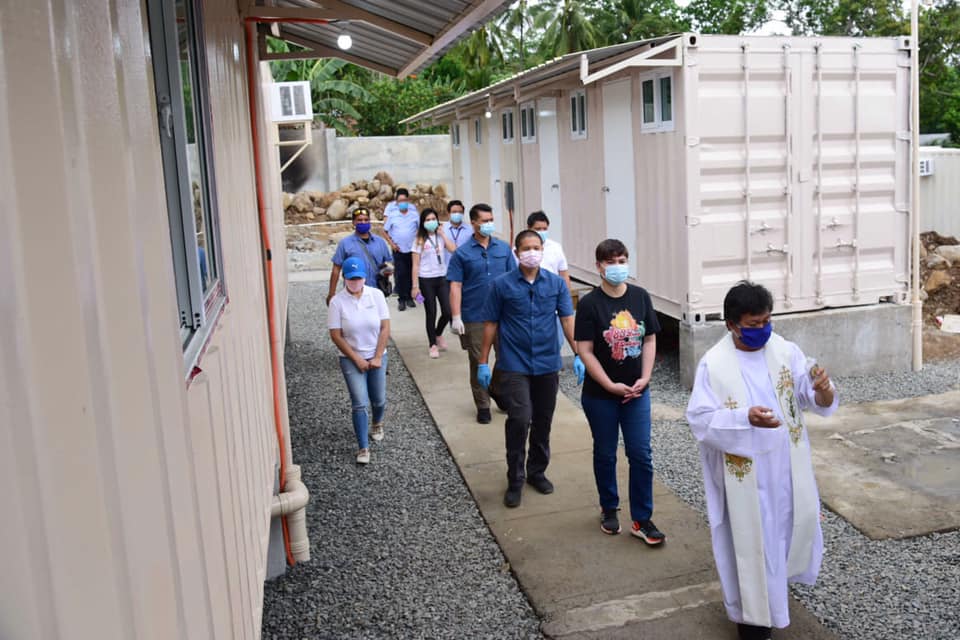 Mayor Sara Duterte (in black shirt), graces the blessing of the temporary treatment and monitoring facility made of container vans, in Malagos, Calinan, Davao Cit on 17 April 2020. Photo courtesy the City Government of Davao
Mayor Sara Duterte (in black shirt), graces the blessing of the temporary treatment and monitoring facility made of container vans, in Malagos, Calinan, Davao Cit on 17 April 2020. Photo courtesy the City Government of Davao
MindaNews followed up with Lopez on Thursday but he sent no reply. On Friday morning, MindaNews again checked with Lopez and he replied: “there was already official statement coming from the facility director.”
The DTRC/Emcor ConVan TTMF is located inside the fenced compound of the Department of Health’s Drug Abuse Treatment and Rehabilitation Center in Malagos,
Dr. Faye Soleil Sexcion-Maruya, manager of the DTRC/Emcor Convan facility wrote a letter to Mayor Sara Duterte on May 27, in response to the MindaNews story, “COVID-19 patient in Davao treatment facility: help us heal, don’t treat us as prisoners.” A copy of Maruya’s letter to the mayor was sent to MindaNews by the City Information Officer morning of May 28.
No briefing
Lillian told MindaNews on Wednesday that she was not given any briefing upon admission late evening of May 21.
According to Maruya, Lillian was briefed by the head nurse on duty, who “firmly attested that she had explained the facility’s rules and regulations INCLUDING the LOCKED DOORS upon admission.”
She said the patient was asked at the receiving area to sign the informed consent “which meant that she understood and agreed with the facility’s rules and regulations.”
She added that when Lillian entered her room, she was contacted through phone by the doctor on duty who “reviewed and reminded” her about the policies.
Lillian told MindaNews on Friday: “Actually dili nila gina isa-isa ug explain ang rules (they did not explain the rules one by one). “How can they do that nga hadlok gani sila madugay ug expose sa patient (they are afraid to be exposed to the patient for a long time). What they do is let you sign the paper. Then you can read the rules later.”
‘Flying virus’
On the issue of borrowing a broom to sweep the floor, Maruya said the patient asked for a broom from the staff and the head nurse informed her using brooms to clean the rooms is not allowed as per IPC (Infection Prevention and Control) protocol. Maruya said the patient answered “paliton nako ang silhig kung di ka muhatag” (I will buy the broom if you won’t give me.”
She said the staff was “intimated” (she must have meant intimidated) “hence gave in to the patient’s wish and gave her the broom and maintained a safe distance while the patient was sweeping the floor.”
Maruya denied the room was dirty. She said the head nurse checked the room and found it clean.
“It has always been a rule in the facility that we are required to clean and disinfect all rooms after discharge and before any admissions,” she said.
Lillian’s account cited in the May 26 MindaNews report was not about her borrowing a broom but another patient who asked for a broom. She said she overheard the staff and utility worker discuss the request and the staff said this is not allowed because “molupad ang virus” (the virus will fly).
Locked up from outside
Lillian said she was able to open the door morning of May 22 and 23 to let sunlight stream into the room but the doors were locked from outside starting May 24.
Maruya said that on May 24, the head nurse on duty reported that the patient “had opened the door twice for a relatively longer time than considerably allowed outside of VS (vital signs) monitoring, meal distribution, and other monitoring activities.”
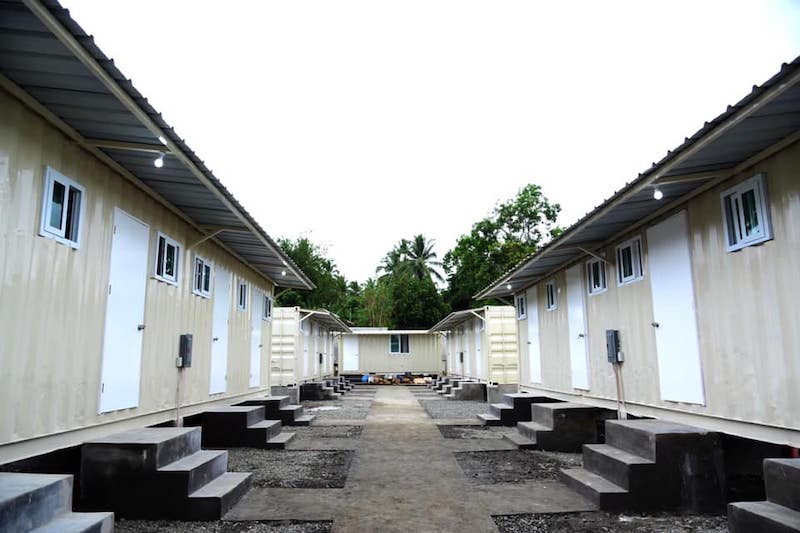 COVID-19 facility in Malagos, Calinan, Davao City, made of container vans April 17, 2020 photo from the FB page of the City Government of Davao
COVID-19 facility in Malagos, Calinan, Davao City, made of container vans April 17, 2020 photo from the FB page of the City Government of Davao
Upon learning this, Maruya said she instructed the staff on duty to “close and lock the doors in order to prevent patients from possibly going out of their rooms.”
“To outsiders, this may seem harsh,” Maruya said but she explained that the facility has been operating for a year now “with reversed locks since it opened,” that security personnel are present 24/7 “in order to report events such as patient and/or staff protocol violations, ensure other patients’ safety, and maintain peace and order.”
Unfortunately, she said, despite their best efforts, some patients still managed to violate IPC protocols.
According to Maruya, ConVan TTMF houses both suspects and confirmed positive patients, “making it more important for patients to remain in their rooms at all times.”
“We cannot simply give in to their requests and demands since the safety of the other patients and medical staff (is) our priority as well. As much as we would like to trust our patient’s promises, we’ve had an incident wherein patients did go out of their rooms despite repeatedly being instructed not to, and even went as far to other clusters. Other patients inside their rooms may see this and this could lead to more demands from more patients to let them out of their rooms because they want to roam around. Again po, we also have COVID Suspects in the area whose safety should not be compromised, not to mention our medical staff as well,” Maruya said.
No problem with facility’s amenities but…
Maruya also pointed out that aside from COVID suspects and positives, the TRC is “also operating now as a Drug Rehabilitation Center catering to drug dependents reporting on an outpatient basis. Imagine the chaos we’ll have even if only one patient goes out to roam around the place.”
Maruya said Lillian’s room is located right next to the nurse’s station “hence if she needs anything, she can easily call up the station. All important numbers, Facebook pages and messengers, and hotlines are provided to the patients. This was repeatedly reminded to her by the staff as well.”
Lillian stressed there is no problem with the facility’s amenities. The problem, she said, is about how the patients are being treated. “Locking in like they are prisoners?” she asked.
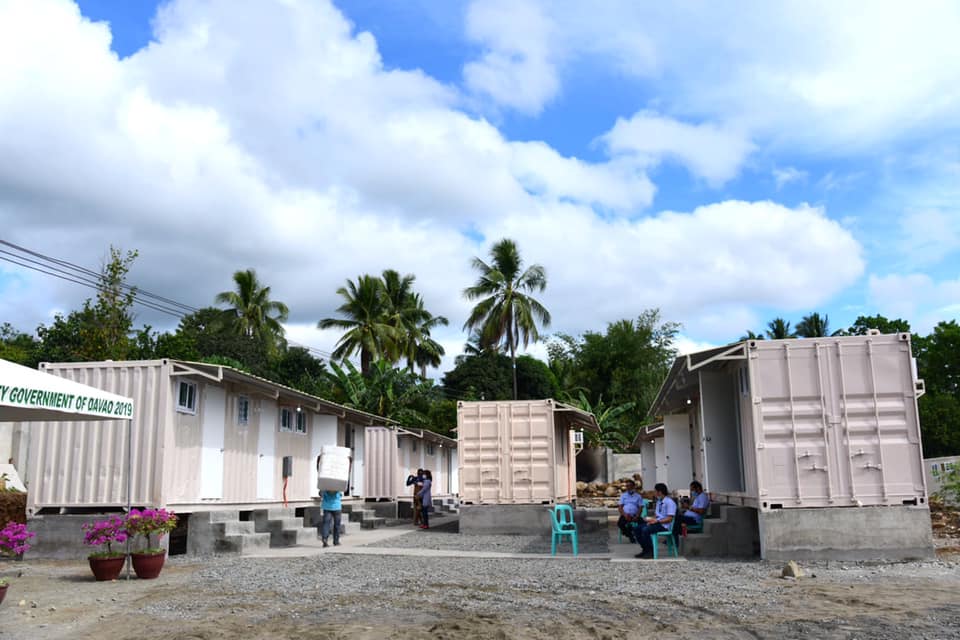 EMCOR ConVan temporary treatment and monitoring facility in Malagos, Calina, Davao City. April 17, 2020 photo grin the FB page of the City Government of Davao
EMCOR ConVan temporary treatment and monitoring facility in Malagos, Calina, Davao City. April 17, 2020 photo grin the FB page of the City Government of Davao
Maruya also said that on May 24, when the staff “tried to enforce again our policy” (lock doors from outside), patient was “uncooperative and was seen and heard shouting at several of our staff including the medical officer on duty and nurse on duty. “As what the medical team members are trained to do, they again explained the situation to the patient but to no avail.”
Lillian said Maruya may have been referring to another patient at the back part from her where her room is located.
She said she heard the staff talk about the male patient who begged them not to lock the door from outside. He was so angry. He would not allow his door to be locked. Lillian said the staff had to deploy a watcher outside the patient’s door. Later, she overheard the watcher complain about lack of sleep.
Fresh air and sunshine
Maruya also denied that Lillian was told by the facility staff to complain for as long as she wants. “Not anyone from the staff (from our doctor to utility) has said this to her. This is an outright lie. She threatened that she will complain about the staff to which they replied that she is free to do so but they have to follow.”
She added that for patients “who cannot really abide by the rules,” they refer them “right away to our mental health hotline or to the IPBM (Institute of Psychiatry and Behavioral Medicine of the Southern Philippines Medical Center) for cases assessed by doctor needing expert evaluation and co-management.”
“We also try to offer them other facilities which we think (are) more comfortable and more convenient for them. At extra difficult situations and when assessed na hindi lang talaga irate or uncooperative ang patient plainly because of attitude, we adjust man also. I personally call them up to assess the situation then pabantayan ko 24/7 sa staff on duty sa tapat ng room after namin magkaron ng kasunduan,” she said.
In response, Lillian said on Friday: “I do understand their rules but allowing opening of doors for a maximum of 30 minutes for fresh air and sunshine is good for the recovery of the patient.”
She stressed that fresh air and sunshine “are good for the emotional and psychological well-being of the patient” and would hasten recovery.
She said she told the staff she would write a letter to the Department of Health and the Inter-Agency Task Force for Emerging Infectious Diseases (IATF) “about them locking the doors from the outside” and one of the facility’s staff allegedly told her “magreklamo ka kung asa nimo gusto basta ang rules mao na (You can complain to whoever but these are the rules). Locking of doors from the outside.”
“Bigger issue”
Lillian said doors can be closed at all time but not locked from outside because “its’ like we are prisoners.”
She noted that even in the infectious disease units in hospitals, they do not lock the door.
Lillian said all she hopes for is that management would “humanize the manner they are running the facility, taking into account wellness and emotional balance during isolation.”
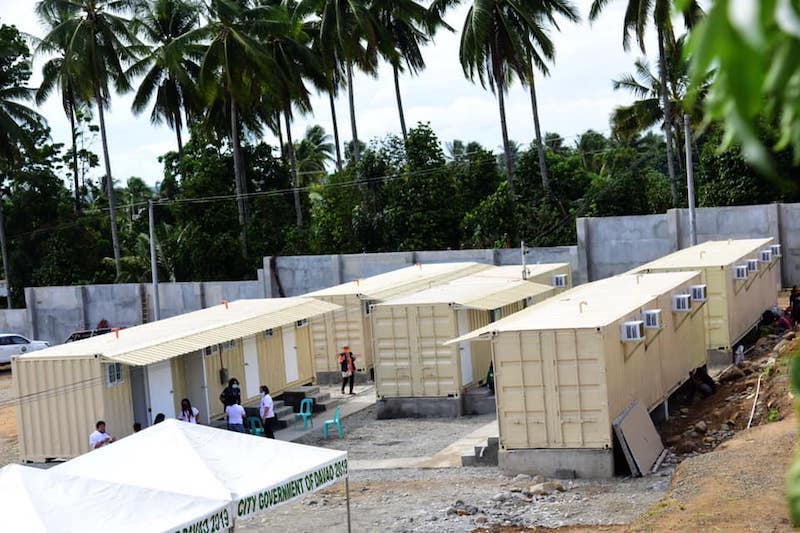 EMCOR ConVan temporary treatment and monitoring facility in Malagos, Calina, Davao City. April 17, 2020 photo grin the FB page of the City Government of Davao
EMCOR ConVan temporary treatment and monitoring facility in Malagos, Calina, Davao City. April 17, 2020 photo grin the FB page of the City Government of Davao
“The issue affecting the emotional and psychological well-being of the patient must be given weight in addressing the treatment or isolation of the infected person. The nitty gritty events should not be used to cover up the bigger issue affecting the well-being of the patient. Any medical doctor or psychiatrist or clinical psychologist will say that locking up a patient from the outside is emotionally and psychologically threatening sa patient,” she said.
“There is a humane way to manage the facility. They choose the part of managing the facility for their convenience and trample on the civil rights of the patients. They can allow opening of doors just for at least 30 minutes in the morning for fresh air and sunshine and 30 minutes late afternoon. Their fear for patients to go out the room and escape can be controlled,” Lillian said.
“It’s easier for them to lock us in. This is not a hospital setting that is enclosed. Studies reveal that even in hospitals, infection from fomites is below 1%,” Lillian said, adding, there appears to be fear of infection “which is understandable but this is an open and well-ventilated area,” not enclosed like hospitals, referring to the fenced compound .
“Humanize”
She said it seems like management of the facility is “for their convenience.”
The rehabilitation center, she said is about a hundred meters away. If their concern is infection, “fact is for you to be infected, you are near and you converse for 15 minutes or more.”
“It’s difficult if fear — which at times can be irrational – and not facts and science, would be the basis for manging the facility,” Lillian said.
On Wednesday, Lillian said she wanted their ordeal known so that the matter can be addressed immediately.
“My heart’s desire is simply for them to treat human beings infected with COVID as persons ba and not add to the emotional trauma these patients are experiencing. It is so painful that a fellow Filipino treats you harshly,” she said.
The 48-room ConVan facility was donated by the Jesus V. Del Rosario Inc. Foundation, and was blessed and inaugurated on April 17, 2020.
No such rule in other TTMFs
There have been no complaints about being locked up in the other TTMFs. In fact, patients are allowed to interact with other patients, albeit from a distance.
Jane, who also tested positive and was isolated at the Palm Residence Inn near the San Pedro Hospital in February, told MindaNews their rooms were not locked up from outside, they could even go out of their rooms “for socializing and yes, sunning.”
She said they were allowed to jog in the corridors, talk with other patients so they don’t get bored but masked and from a distance, and could even share food.
Dean Ortiz, a former journalist who is now spokesperson of the Department of Public Works and Highways regional office here, tested positive for COVID in late October and was brought to the Mamay Inn and Resort in Lanang.
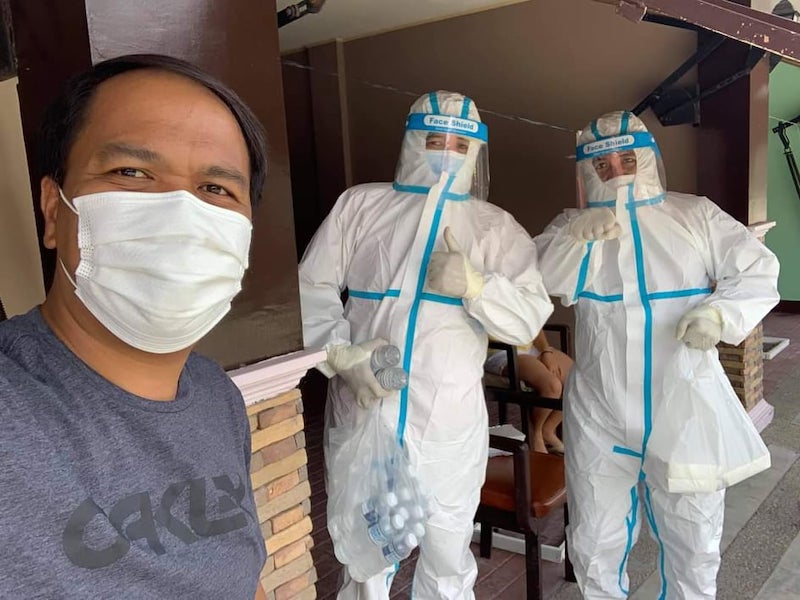 Dean Ortiz (L), takes a photo of himself with two members of the health personnel at the Mamay inn and Resort temporary treatment and monitoring facility in Davao City.
Dean Ortiz (L), takes a photo of himself with two members of the health personnel at the Mamay inn and Resort temporary treatment and monitoring facility in Davao City.
At Mamay, their doors were not locked, they could linger in their individual garage, step out a few meters for sunning and could socialize with other patients but observing health protocols strictly.
In an essay he posted on social media and which he allowed MindaNews to publish, he said he made friends with other patients in that facility.
“These guys were positive themselves, positive with COVID-19 and positive that we will all get out of this somehow. We shared stories of what happened to each of us and how we got there. In the end, we shared one story — discrimination.”
“The hardest part perhaps of being infected is the fact that too many people know too much about the disease yet choose to be uneducated, even ignorant, on how they treat people who have the dreaded disease. I’m no doctor so I won’t preach further about it, but I have common sense telling me that it’s not as deadly as we think it is. Wear a mask and a face shield and the chances of getting it are very slim. Once you have it, be a good patient. Take your vitamins, arm your immune system. People aren’t crazy enough to get the disease intentionally. I remember my boss saying ‘who wants to get it in the first place?,’ his wisdom lingered in mind through the whole ordeal,” Ortiz wrote.
Within that facility, he said, “it was nice to have a support group to share experiences with. We may have come from different walks of life but out there, we were among friends and equals. That row of rooms sheltered people whose sickness stripped them of their masks and pretenses. It was just about humanity.” (Carolyn O. Arguillas / MindaNews)
READ:
COVID-19 patient in Davao treatment facility: help us heal, don’t treat us as prisoners
QUARANTINE DIARIES: Being COVID-19 positive ends when positivity begins when you allow hope to prevail amidst all the negativity
